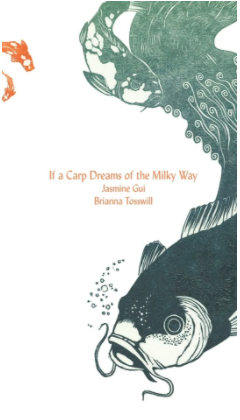
If a Carp Dreams of the Milky Way
By Jasmine Gui, with art by Brianna Tosswill
Penrose Press, 2019
Review by Manahil Bandukwala
Published by Penrose Press, Jasmine Gui’s chapbook, If a Carp Dreams of the Milky Way explores mythology through lyric. Accompanied by illustrations by Penrose publisher Brianna Tosswill, Gui’s long poem is a surreal and otherworldly journey.
Published as a scroll, poetry and visual art occupy a shared and overlapping space in If a Carp Dreams of the Milky Way. Materiality bears a significant role in the final art piece. With the images printed from carved linoleum and the text from a combination of lead type and polymer plates, this chapbook has its roots in the world of printmaking rather than bookbinding. Publishing literature while keeping visual arts at the forefront creates an entirely unique book object that doubles as an art piece that can be admired for its aesthetic quality. Penrose Press published an accompanying paperback print version of the chapbook, which is the copy I am reviewing from.
Translating the continuous nature of a long poem on a scroll into a book is a challenging feat, but Penrose Press accomplishes this in an impressive way. The pages of If a Carp Dreams of the Milky Way are not bound along the seam like a traditional book; they unfold accordion-style to about a metre long, capturing the effect of an unrolled scroll. The emotive quality evoked by the fine art object strikes a balance with compensation for time and skill put into a work of art, and creates an accessible version of the chapbook for a larger reading audience.
Gui draws on a Chinese idiom for the premise of the chapbook: a carp will become a dragon if it is able to swim against the current of the Yellow River and jump over the waterfall. In this folktale, the poem’s narrator embarks on a journey to process loss and uncertainty. Gui opens the poem with the line, “I witness both wave and particle but grasp neither,” setting the stage for the story of a journey that attempts to excavate but cannot find.
The line between mythological and cosmological blur: “Mood is the moon / destined to one day / fold into Mars / itself.” Gui takes the expanse of space and distills it into an image of smallness. There is a futility in things if they can expand and collapse so easily.
Like Gui’s long poem, Tosswill’s visual art features a single carp that swims its way down the scroll. The carp’s curved body weaves through the poem’s stanzas. It intersects with being a waterfall, an asteroid field, a tree, a constellation, a tangle of threads. A journey of search is chaotic, yet Gui anchors this chaos in specific moments that all contain an underlying grief. The emptiness, vastness, and darkness of space weigh down as Gui writes, “Smudged against my breath, / you become vapour, / a patch of water bank; / polished flesh tumbled in undertow.”
The theme of collapse, something that visualizes what accompanies grief, travels across stanzas. “Verse is a dent in space – weight immaterial / and negative. Stanza unfolding / like bolted cloth across time.” The image-heavy lines Gui crafts evoke absence and permanence, two contradictory elements of being. The curve of the descending carp gives a direct visual image to the dent Gui describes. For this section of the chapbook, the carp is dotted with stars, appearing more as the negative space of the cosmos than a tangible creature making its way up a river.
Gui conveys the possibility of interiority and closeness to be overwhelming and painful. She writes, “You: a body among bodies / frothing into scale. / The words refracting where your / tongue begins to split.” There is an unexpectedness to where these images and journeys may take you, a slowness to the pacing and rhythm that lets this difficult sorrow seep in.
An apt way to describe the journey of this chapbook is of sliding down the back of Tosswill’s orange and blue carp. “This journey will not teach / healing or even anything about you.” Like all journeys, the physicality of the quest culminates in lingering thoughts over its purpose in the end. Weightlessness anchors itself as the chapbook reaches its close, but Gui gives no full closure. Searches do not yield the answer you look for and quests linger on.
If a Carp Dreams of the Milky Way demonstrates the possibilities of multidisciplinary collaborations to evoke a new type of heightened emotional response. This is poetry and art of dream and myth that, like folklore, carries on across generations and takes a form unique to its storyteller.
Manahil Bandukwala is a Pakistani writer and visual artist. Her most recent project, Reth aur Reghistan, is a multidisciplinary exploration of folklore from Pakistan, and is carried out in collaboration with her sister, Nimra. See more at sculpturalstorytelling.com. She is the author of two chapbooks, Paper Doll (Anstruther Press, 2019) and Pipe Rose (battleaxe press, 2018). She is the Coordinating Editor for Arc Poetry Magazine, and sits on the editorial board of Canthius. See more at manahils.com